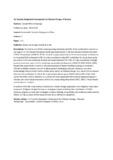12 Tourism Adaptation Frameworks for Climate Change: A Review
Abstract
Tourism is one of the fastest growing industries globally. It has continued to record an average of 3.5–4% despite the global challenges experienced in the last decade including the latest COVID-19 pandemic (UNWTO, 2019). Tourism is appreciated due to its social economic contribution to the global GDP estimated at 9%. It is also considered a big GDP contributor for many developing economies that have embraced tourism estimated between 10–13%. It is also considered strategic poverty eradicator and a tool for achieving sustainable development (UNWTO-UNEP-WMO, 2008). Despite the potential for tourism in the advancement of better livelihood among community’s climate variability remains one of the phenomenon challenging tourism. However, we must acknowledge that tourism is both a victim and a vector of climate change. As a vector it is estimated that tourism contributes to about 5% of global greenhouse gases (GHGs) where 85% of the GHG comes from the aviation industry. As a victim we must appreciate that tourism depends largely on climate and nature-based resources which are already being threatened (IPCC, 2007). These threats can be direct or indirect.
In order to limit the vulnerability of tourism to climate change adaptation and mitigation have been proposed. Mitigation largely focuses on strategies aimed at limiting the contribution of GHGs whereas adaptation deals with strategies aimed at limiting vulnerability and resilience enhancement. Hence, for the purpose of this research note focus will be on adaptation.

